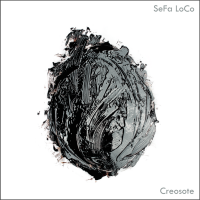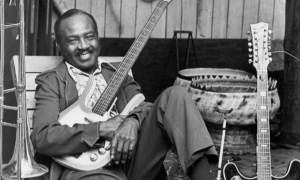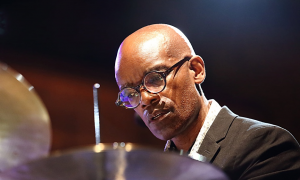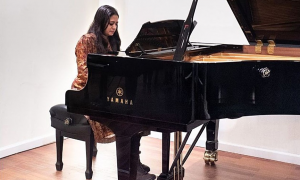Home » Jazz Articles » Under the Radar » Ill Considered - Reconsidered
Ill Considered - Reconsidered

Courtesy Lisa Wormsley
Our tastes are so wide and varied, that what comes out in Ill Considered is a more subconscious distillation of our musical tastes combined with the emotions that each of us feels we need to express in the moment.
—Idris Rahman
London Calling, Again
Around 2010, the South London jazz scene began breaking with tradition for an alternative union of music rooted in global cultures. It represented a fundamental change in the way young Londoners related to music; the rhythms were infused with hip hop, spiritual jazz, dubstep, funk, groove, reggae, and future soul in various combinations. In no small part, jazz was returning to its creators; repurposed for a new world culture.The French-born DJ/Producer Gilles Jérôme Moehrle (aka Gilles Patterson) began as a pirate radio host after helping other off-shore programmers set up their radio transmitters. He was a host on the underground station Radio Invicta that broadcast in London from 1970 to 1984. The station's slogan was "Soul over London." It was the first UK station to play only soul music. In 2019 Moehrle launched the We Out Here music festival in the UK, from which he produced an album of the same name on Brownswood Records the same year. We Out Here brought together many rising stars from the south London club scene including Ezra Collective, Moses Boyd, Theon Cross, Nubya Garcia, Shabaka Hutchings, Joe Armon-Jones, Alexander Hawkins, Daniel Casimir, and others.
Elsewhere in London, the ranks of alt-jazz were being populated with the likes of trumpeters Sheila Maurice-Grey and Bahrain-born Yazz Ahmed, drummer Tom Skinner, vocalists Zara McFarlane and Julia Biel, pianist Ashley Henry and trombonist Nathaniel Cross (Theon's brother). There is a good amount of movement within the creative circle these artists occupy, and Boyd, Garcia, and Hutchings frequently show up in supporting roles. Saxophonists occupy a prominent place in the UK movement. Shabaka Hutchings' Sons of Kemet debuted in 2013 and gained global accolades with Your Queen is a Reptile (Impulse!, Verve Records, 2018). The current breed of London-based saxophonists was getting a significant boost from the award-winning Binker Golding whose duo with Moses Boyd brought recognition beyond his home region. A relative senior citizen in this company, Soweto Kinch is a jazz saxophonist, and rapper whose Conversations With The Unseen (Dune Records, 2003) was nominated for the prestigious Mercury Music Prize. But among this group of reed players and composers, there has been no more a diverse and prolific player than Idris Rahman.
Cross-Pollinating the Wildflowers
Mainly known for saxophone and clarinet, Idris Rahman also plays flute, bass, keyboards, and sings. In his chronological history with bands, he doesn't so much move on, as building additively on his repertoire. Rahman's sister Zoe Rahman, a popular London jazz pianist/composer/leader, was an early member of the jazz/afrobeat/reggae improvisational group Soothsayers, founded by her brother and trumpeter Robin Hopcraft. The group debuted in 2000 and continues with those two core members in 2021. Early on, the Soothsayers were influenced by South African jazz giants such as Abdullah Ibrahim and Hugh Masekela, Nigerian multi-instrumentalist Fela Kuti, Miles Davis, reggae legend Bob Marley and a myriad of world musics. The Rahman siblings have also performed and recorded together on Zoe Rahman & Idris Rahman—Where Rivers Meet (Manushi Records, 2008) and Live: Zoe Rahman Trio with Special Guest Idris Rahman (Manushi Records, 2009). In 2017, Wildflower sprouted.A trio consisting of Rahman, bassist Leon Brichard and Sons of Kemet drummer Tom Skinner, Wildflower came together from the South London music community in 2017. A French bassist and producer, Brichard first performed with Rahman as members of The Fontanelles in 2011; that multi-genre ensemble included Hopcraft and frequent Ill Considered percussionist Satin Singh. Wildflower has released three albums to date. The trio makes music that breathes between its endeavors in jazz, soul, funk, and Afrobeat. In the same year Wildflower formed, Rahman, Brichard, and drummer Emre Ramazanoglu founded Ill Considered, bringing Rahman along immediately. Ill Considered drummer Ramazanoglu's jazz credentials are limited to pianist Keith Tippett and Theon Cross, but his pop credits included stars such as Kylie Minogue, Carly Rae Jepson, Mark Ronson, Sia, and Marc Almond. Across projects, he has served as a musician, engineer, and producer. Ramazanoglu is rarely the sole percussionist on Ill Considered recordings, with Yahael Camara-Onono contributing on two releases and Satin Singh on multiple albums. There've been just a couple of additional guests such as saxophonist Tamar Osborne, and guitarist Steve Ashmore. Replacing Brichard on bass the new album, Liminal Space (New Soil, 2021) is Liran Donin who had appeared on the 2021 multi-media project, The Stroke (Self-Produced).
Ill Considered
In barely four years, Ill Considered has released twelve albums, most from live performances. Each is fearlessly original with immense rhythms, dark tones, and paradoxes that explain themselves in their own good time. Ill Considered has managed to make the lack of a formula work flawlessly. The group is most often anchored by the core trio/quartet, recording free improvisations, completely spontaneous and without any planning. Often without any communication whatsoever. Typically genre-blind but jazz-driven, the group nevertheless turned out a Christmas album that, while filled with classic tunes, is pure Ill Considered in style. In the past five years, the group has ridden the new wave of popular club jazz/improvisation without the benefit—or detriment—of hyperbole. That may be a key aspect in the purity of Ill Considerer's music. Liminal Space is a different type of venture for the group. Donin is now the bassist of record, with a new label and a studio setting, an ensemble worth of guests populate the album. Despite the changes, Liminal Space is unmistakably Ill Considered. In September of 2021, I had the opportunity to interview the members of the group.Idris Rahman/Emre Ramazanoglu/Liran Donin
All About Jazz: Ill Considered has only been around since 2017, but your new 2021 release Liminal Space is your twelfth album. That's more than prolific, given the high quality of each release. As most of your work has been self-produced, how do you decide each album's content and release schedule?Idris Rahman: The first album set the tone for the method we have used to record, produce and release our albums—it was improvised and recorded in a two-hour session at Emre's studio, and was pretty much mixed/mastered in the same session, which allowed a very quick turnaround to getting it released. The main impetus for this band is to play and record as often as possible and to release what we feel is the strongest material from the various gigs and sessions we do. Emre is a world-class producer and he's managed to make recordings we've done in hotel rooms with just a laptop into viable releasable material, so we're never short of opportunities to record and to try new musical ideas.
Liminal Space is slightly different in that we spent more time in post-production after we had done initial recording sessions. The method was the same, but we had the luxury of listening back and adding some subtle layers of woodwind, percussion, etc. to augment the improvisations.
AAJ: Before there was an official "Ill Considered" group, what kind of music were each of you working in? How did the group come together in its initial lineup and evolve to today's formation?
Emre Ramazanoglu: I initially met Idris playing in Family Atlantica. I effectively depped for Tom in a little Wildflower gig after Idris asked and the resulting music was so different that it had to be seen as a different band. I loved listening to what Tom had done in the band, but I approached it differently and it worked differently. The first album was genuinely just a jam session that felt good.
Liran Donin: I was lucky enough to get the call from Idris to step in at the very last minute to do The Stroke the studio album. Idris and I played for long time together in various formations and I knew that we will do something together again, so it was an immediate 'Yes' before he even finished to explain whatever project.
AAJ: London is the most culturally diverse city in Europe; a melting pot of world music, jazz, rock, hip hop, and genre-less new music. What musical influences guide Ill Considered?
ER: Difficult to answer, apologies! We never really think in terms of influences and certainly haven't ever discussed them with each other! We all have a lot of similar loves but also lots of individual tastes that the others might not share.
IR: We're not really influenced by any particular music—we've all been involved in so many different styles of music, and our tastes are so wide and varied, that what comes out in Ill Considered is a more subconscious distillation of our musical tastes combined with the emotions that each of us feels we need to express in the moment.
AAJ: The most innovative creative music of the past five-ten years has not been coming out of the U.S. but rather the London jazz scene. On this side of the Atlantic, some listeners were surprised, and others had yet to catch on. For London-based creative musicians, was this a recognizable phenomenon?
ER: Only in as much as we started getting more gigs in different venues and I found some of my mainstream work starting to crossover with the jazz scene. Pretty unexpected and pretty cool.
LD: I see what you mean, it's recognisable and yet it isn't, mostly because for most of us it's hard to see or measure what is happening outside of our working environment—we're just doing it—and having a ball whilst at it :) but then, as Emre was saying, the attention is coming from all directions; touring, press, crossover work; I can see that not only with this band but with many other projects I'm involved in.
AAJ: Ill Considered is celebrated for live performances, audience interaction, and the resulting vinyl recordings. It would seem that performing entirely improvised sets would be a stressful experience, at least initially. Was the transition to the studio-recorded Liminal Space equally concerning?
ER: Zero stress or drama in either case I'm afraid! We're super comfortable just playing with each other and it's always a joy to take that in front of an (appreciative) audience. We've all come from years of improvising so playing in Ill Considered is just a blissful experience. It's a release and so satisfying.
LD: You see, it can be stressful if the people you are playing with are stressful, un-inspiring or a total pain in the ass!—but with these guys... I couldn't have wished for anyone better to create and make! super chilled, super relaxed and truly beautiful humans to share space with! And so performing an entirely improvised set becomes so much fun and makes you really want to give the most enjoyable experience to the people you share the stage with as well as audiences.
AAJ: How much of a factor was the COVID-19 lockdown in the decision to produce your first full-length studio album at this time?
IR: Lockdown helped a lot in the creation of this album—after some initial recording sessions I had a lot of time to listen back and write/record melodies/backings etc., and I actually used the material to play over every morning for a few months as a means of staying positive and keeping a connection with my instruments. I recorded a lot of what I did when I practiced, and the arrangements came from choosing the best bits from these recordings. So again, it was a very improvised and subconscious method of arranging and completing the album.
AAJ: Liran, you joined the group in 2020, appearing on Ill Considered 10-The Stroke. What were your thoughts about replacing bassist Leon Brichard, a founding member of the group?
LD: Leon is an OUTSTANDING bassist! A creative powerhouse behind some extraordinary projects including this one! So, these are big shoes to fill of course! Some of the greatest skills you develop as a professional musician is to do just that, without worrying too much about those shoes...you learn to bring your own voice, sound and energy to a band that might have been around for some years before. These things can happen (often!), so to be able to adjust yet remain who you are with gratitude and respect is key, also it's important to point out that both Idris and Em were very supportive in their approach, making sure we sound honest and true.
AAJ: Liran, your leader debut, 8 Songs (Cavalo Records, 2018), hit several "Best of..." lists, and the music is often lyrical and far removed from much of your previous work with the volatile Led Bib. Ill Considered doesn't fit neatly with those albums or any category. Do you find yourself most musically comfortable in a particular setting?
LD: Not sure really, I'm working on my 2nd album now, and it sounds very, very different from the first, as well as to Ill Cons or the other project I do, I'd like to think that in my roles as composer, record producer, and bassist I leave some sort of a trail that relates to me. I think the lyrical part is very much always there but I'm happy to leave it for others [to] figure it out.
AAJ: Ill Considered has an affinity for multi-media projects, working with artist Vincent De Boer and visual artist Lisa Wormsley, and others. Given the level of free improvising in the music, what are the challenges of coordinating visual art/video and music?
IR: When we're working with such creative people as Vincent and Lisa, we are free to improvise in the same way that we would normally do, but the improvisations take on an added depth and meaning if we are provided with visual art of the quality they produce. It's a massive pleasure to improvise live with these creative beings, and we're looking forward to doing more in the future.
AAJ: Emre, as a founding member, how would you say the music of Ill Considered has changed over time? In particular, how would you describe Liminal Space as being another step in the group's evolution?
ER: It's just always been an expression of what was happening at the time of the recording! Very natural and as mentioned before, never discussed or messed with. Liminal Space is different in that it was started in the same way, but then developed with Idris's imagination for horn arrangements allowed free reign and guests invited onboard as well as percussion and other overdubs added in a way we never have before. It's more developed than previous records but born from the same method.
AAJ: There are a lot of diverse ideas on Liminal Space; "Sandstorm" has a cross-cultural element; "Dervish," the feel of metal rock, and "The Lurch" could be channeling Sun Ra through a furious blaze. Understanding that the band does little in the way of pre-planning, there is a clarity to the music that suggests some initial structure. What kind of platform are you all jumping from?
ER: Absolutely none! We just have common tastes I think, and an understanding of what each other likes. We just play and we give each other confidence to grasp the moment and make something we all get off on!
AAJ: While there are rudiments of Eastern music in the work of Ill Considered, they are nuanced. Do these elements occur naturally in the improvisations, or is there a conscious effort to explore and incorporate non-Western styles?
LD: I think Emre nailed it really, it's that common musical ground that stirs us naturally as a group. For example, Emre sort of knew I can play the guimbri [a three stringed lute-like instrument from Morocco] and he went, "why not try a few tracks with the guimbri as well as electric bass?" so before you know it the guimbri is all over the place and you can't really unhear it anymore—it was that natural! I think that when it's good we know it's good. What makes this really special and inspiring for me to work alongside these two is how open they are to whatever sounds good—it can literally be anything! As long as it sounds good, anything goes!!
IR: Again, there's nothing conscious in our methods, but yes there are some non-western styles that come out naturally as a result of our cultural backgrounds and the music we've been involved in. For example, I'm half Bangaldeshi and I've played a lot of Bengali folk music, so I guess that comes out sometimes, but I've also played a lot of African music/reggae/Brazilian music etc. etc., so it's all in there waiting to come out when it feels right.
AAJ: Ill Considered has typically worked with only its core group, which sometimes included percussionist Satin Singh and guitarist Steve Ashmore. Liminal Space breaks from the norm with eight additional collaborators, including Sons of Kemet tubist Theon Cross, saxophonist Tamar Osborn of The Fontanelles, and Soothsayers' trumpeter Robin Hopcraft. What inspired the expanded roster of players, and how were the musicians chosen for this project?
IR: We wanted to add some inspiring guests to this album, and again partly helped by lockdown, we were able to call our favourite musicians and get them involved. It was a massive pleasure collaborating with all of the guest artists and something that we would like to do more of in both recorded and live scenarios in the future. Ill Considered is great with just the core 3 members, but it is a joy to share musical ideas with any musician who is humble enough to listen, tune in and express themselves in whatever way the moment dictates.
AAJ: Emre, you've worked across many genres, including jazz, rock, pop, electronic, afrobeat, and film music. Did your role as an audio engineer for major labels stir your interest in music styles that you hadn't been exposed to?
ER: I'm very lucky in getting to listen to SO much music on a daily basis. It definitely is a privileged position and I sometimes find little hooks into new genres for sure. I'm certainly influenced by what I'm working on generally, but not sure how much of that filters into Ill Considered.
AAJ: Ill Considered has resumed live performances with dates in late 2021. Given the group's predisposition for spontaneous improvisation, will you cover material from Liminal Space?
IR: We might do—it's not something we're necessarily planning, but I'm sure it will happen.
AAJ: Looking ahead, is there something different you anticipate for Ill Considered?
IR: I think we will continue with the same improvised approach forever—we're having too much fun to start trying to change anything. The best thing about this band is we can play what we feel when we feel it. We wouldn't want to change that!
Recommended Listening
 Ill Considered: Liminal Space
Ill Considered: Liminal Space New Soil
2021
The rare studio recording for the current trio formation of Ill Considered loses none of the visceral energy of their marathon live recordings. The trio incorporated live performance with studio modifications from the extensive roster of guests. The approach is frequently amorphous and could have been a jumble. Yet, there's nothing messy or distracting about the multiple layers of production and the free-form contributions.
"First Light" echoes a familiar Ill Considered approach as it builds from a slow, soulful opening to a frenzy of energized horns, then retreats. Rahman's multi-tasking on saxophone, clarinets, and flute, enhanced by saxophonist Kaidi Akinnibi, trumpeter Robin Hopcraft, and Theon Cross on tuba, add powerful dynamics to the piece. On "Dust" and "Prayer," Arabic dialects of Northwest Africa meet in a mystical unity of tribal essence and the spiritual jazz of Pharoah Sanders. Percussionist Sarathy Korwar—playing tabla—adds subtle South Asian distinction to "The Lurch."
Ill Considered increasingly becomes a shining hope for the future of jazz. Self-assured in their group agenda, the trio flawlessly navigates borderless territories with such ease that they inspire each other and the listener. They bring the genre to a new, younger, non-jazz audience that may stick around for their hypnotically unflustered grooves and primordial rhythms. Not yet riding the crest of London's contemporary jazz wave, Ill Considered has limitless potential.
 Ill Considered: 6
Ill Considered: 6 Self Produced
2019
On 6, the quartet expands to a quintet with Steve Ashmore on guitar on many of the nine tracks. The music of Ill Considered has elements of post-minimalism, hard bop, and a great deal of free improvisation. 5 and 6 were released simultaneously but vary stylistically. While the former features fewer—and extended—pieces in a contemplative ambiance, 6 bristles with tension and antagonism while sharing some of those reflective qualities. It isn't an abrupt alteration from one piece to another but a skillfully executed amalgamation of approaches, as on "Lies" with its serene opening, detonated by the growl of Rahman's tenor, only to morph into a minimal bass solo. Similarly, "Gunning," "Ward" and "I Didn't" use these paradigm shifts to effect high drama amid mesmerizing dreamscapes. "Waterfall" and "Percolator" represent an overall edginess atypical of the Ill Considered approach, adding to the album's diversity; Ashmore produces gauzy, iridescent blasts, but at a distance that enhances the music rather than drastically altering the vibe. Percussionists Emre Ramazanoglu and Satin Singh and Leon Brichard's relentlessly driving bass anchor Rahman's knotted labyrinth of textures.
 Ill Considered 3
Ill Considered 3 Self Produced
2018
Rahman, Ramazanoglu, Brichard, and Singh, came off their successful Live At The Crypt (Self-produced, 2017) project, with the notion of going against their self-imposed grain. Here the idea was to start with more composed structures and improvise around those. However, the group quickly appreciated that there was strength in their impulsiveness and musical unconventionality. With Ill Considered 3, it also became apparent that the marketing plan—a few hundred vinyl copies—would no longer be sufficient for their growing base. Each of the members has a brief dedicated track, with Ramazanoglu and Singh playing a duet. Contemplative passages and ear-popping apexes animate this third entry from Ill Considered.
Tags
About Ill Considered
Instrument: Band / ensemble / orchestra
PREVIOUS / NEXT
Support All About Jazz
 All About Jazz has been a pillar of jazz since 1995, championing it as an art form and, more importantly, supporting the musicians who make it. Our enduring commitment has made "AAJ" one of the most culturally important websites of its kind, read by hundreds of thousands of fans, musicians and industry figures every month.
All About Jazz has been a pillar of jazz since 1995, championing it as an art form and, more importantly, supporting the musicians who make it. Our enduring commitment has made "AAJ" one of the most culturally important websites of its kind, read by hundreds of thousands of fans, musicians and industry figures every month.

























